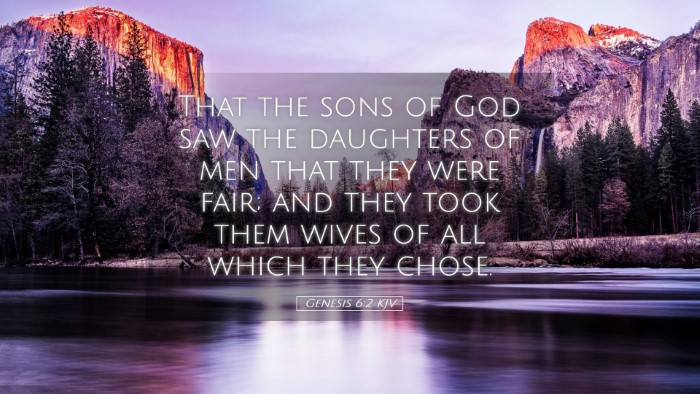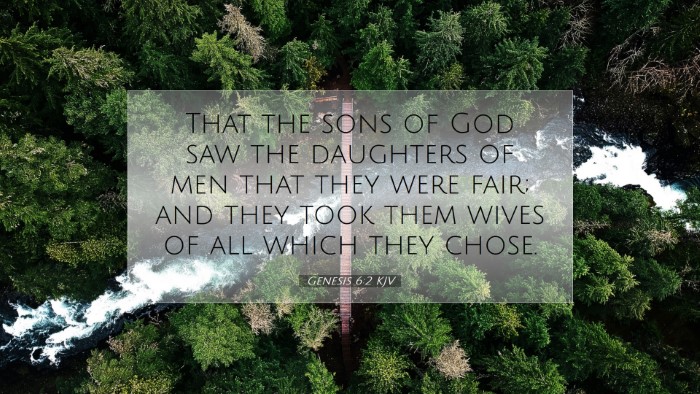Commentary on Genesis 6:2
Genesis 6:2 states, “the sons of God saw the daughters of men that they were fair; and they took them wives of all which they chose.” This verse raises several questions regarding the identity of the “sons of God” and the implications of their actions. The insights from notable public domain commentators provide a comprehensive understanding of this complex passage.
Introduction
This verse occurs in the context of the antediluvian (pre-flood) world, which is marked by a progressive decline in righteousness and moral integrity. The interaction between the 'sons of God' and the 'daughters of men' describes a critical moment leading to the divine judgment of the Great Flood. Commentators through the ages have explored the meanings and theological implications of this pivotal text.
Interpretation of “Sons of God”
Matthew Henry's Perspective:
Matthew Henry interprets the “sons of God” as referring to the descendants of Seth, highlighting a lineage committed to God. He contrasts them with the “daughters of men,” likely indicating the descendants of Cain who are associated with worldliness and sin. This union signifies a compromise in faith and morality, leading to catastrophic consequences.
Albert Barnes' Commentary:
Albert Barnes offers a nuanced view, presenting the possibility that “sons of God” could refer to fallen angels. He argues that this interpretation aligns with the historical understanding of ‘watchers’ in ancient texts. He emphasizes that regardless of interpretation, the act of intermingling represents a breach of divine order and an awakening of sinful inclinations.
Adam Clarke's Insights:
Adam Clarke aligns more closely with the view of the “sons of God” as the righteous lineage of Seth. He stresses the perils of faith becoming diluted through ungodly associations. Clarke notes that this union not only reflects a physical relationship but also a spiritual turmoil that leads to the eventual judgment of mankind.
The Nature of the Union
The union between the “sons of God” and the “daughters of men” carries both social and theological implications. By marrying outside their faithful lineage, these men transgressed the distinctiveness God requires from His people.
Social Implications
Henry notes that this social amalgamation leads to the weakening of covenantal belonging—a direct violation of the commandments that characterized Israel's identity. He underscores the principle that believers must be cautious of associations and unions that may lead them away from their covenant with God.
Barnes elaborates on the social consequences, indicating that such unions likely contributed to the moral decay of society, resulting in widespread corruption. He warns that the blending of godly heritage with worldly values invites God’s wrath, amplifying the need for believers to maintain their spiritual integrity.
Theological Concerns
All three commentators emphasize that this event is not just a social mishap but a profound theological crisis. The act of the “sons of God” marrying the “daughters of men” symbolizes a departure from obedience to God’s design for human relationships and community.
Clarke asserts that these actions exemplify a type of disobedience that culminates in the necessity of divine judgment—reflecting God’s holiness and the inevitability of justice. This reinforces the idea that the moral fabric of society is deeply intertwined with its spiritual allegiance.
Historical Context
This passage must be understood against the backdrop of ancient Near Eastern cultures. The patterns of intermarriage were often viewed through the lens of power dynamics and alliances.
Comparative Literary Insights
Henry points out that in various ancient texts, such marriages were often associated with the breaking of boundaries that were established by God, leading to chaos. He evokes the idea that the rebellion against established divine order often precedes imminent judgment.
Barnes draws on historical examples to illustrate how nations or tribes that intermarried with those outside their belief system often faced dire consequences, emphasizing the timeless truth that divine principles transcend cultural norms.
Consequential Reflection
Ultimately, the actions of the “sons of God” and their subsequent relationships result in increased wickedness, as outlined in the verses that follow. The interconnectedness of human relationship choices and divine judgment is a recurrent theme in Scripture.
Lessons for Contemporary Believers
Through the lens of this commentary, modern believers can glean significant wisdom regarding their relational pursuits. Henry effectively summarizes the essence of the passage as a cautionary tale emphasizing the importance of remaining faithful to God in all areas of life, particularly within relationships.
Barnes echoes this sentiment, urging contemporary readers to weigh the spiritual implications of their unions and associations, whether in marriage, friendships, or partnerships. The commitment to God and His ways should govern all relationships.
Clarke provides a call to action, encouraging believers to uphold their covenant responsibilities and engage critically with societal influences that promote compromise. The need for discernment amidst cultural pressures requires vigilant adherence to scriptural mandates.
Conclusion
Genesis 6:2 serves as a pivotal verse in understanding the deterioration of moral integrity following the Creation. The insights from public domain commentaries highlight the significance of adhering to God’s design in relationships and the resulting consequences of deviation from His principles. As pastors, students, theologians, and Bible scholars delve into this text, they find a rich tapestry of warning and wisdom that resonates across generations—a reminder that faithfulness to God’s standards is vital in not only personal but communal witness.


